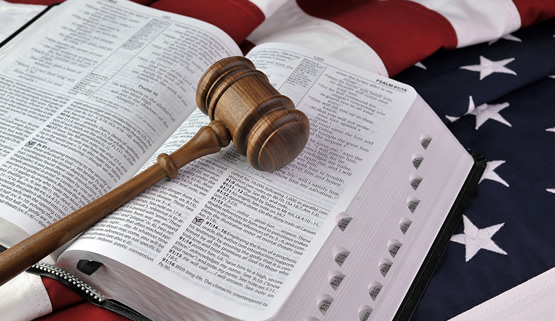A Crucial Line of Defense for Catholic Education
Catholic education could face severe hardships should the religious protection that is built into Title IX — the federal law banning sex discrimination — be taken away. And that is exactly what some activists and the Biden administration hopeto do.
The Administration and some federal courts now interpret Title IX as a ban on teaching and upholding authentic gender, sexuality and marriage. But since the law was first enacted in 1972, Title IX has exempted religious schools and colleges from any application of the law that conflicts with their religious beliefs. Predictably, LGBT activists are now striving to undo that exemption.
For Catholics, it should be a top priority to hold that line. It doesn’t mean that we should focus only on exempting religion from bad laws while our culture collapses. But ultimately winning the culture war requires that we form young people in faith, reason and wisdom — all of which are in short supply today. I see no path to a renewal of the Church and culture without a renewal of faithful Catholic education.
We must carve out protection for Catholic education if we are ever to win the larger battle. If the religious exemption to Title IX falls, Catholic schools and colleges will probably fall also, and even Catholic homeschooling may be targeted. That’s because the impact will be felt far beyond restrictions on federal money for education, which is the trigger that subjects an institution to Title IX. Even more, a collapse of the Title IX religious exemption is likely to cascade into anti-Catholic bigotry in state law, accreditation, academic associations, athletic leagues, etc., until there is minimal tolerance for any form of truly Catholic education.
Lawsuits target exemption
Among the threats to the Title IX religious exemption are two lawsuits which are unlikely to succeed — but if they do, the consequences could be devastating.
One of the lawsuits seeks to exploit a narrow interpretation of the Title IX exemption itself. The exemption states that Title IX “shall not apply to an educational institution which is controlled by a religious organization, if the application of this subsection would not be consistent with the religious tenets of such organization.”
Two students who were expelled from Fuller Theological Seminary for violating rules against same-sex unions have asked the Ninth Circuit Court of Appeals to deny the seminary access to the Title IX exemption, because Fuller is nondenominational and independent of any organized religion. This, they argue, is not within the scope of institutions that are “controlled by a religious organization.”
The danger to Catholic education is enormous, should this argument prevail. Most Catholic colleges and many lay-established Catholic schools in the U.S. are not legally owned by the Church. They have independent boards of trustees that legally control the institutions. If the Title IX exemption is interpreted to exclude such independent operations, many of our Catholic schools and colleges as well as America’s nondenominational Christian institutions would no longer be protected.
Just last month, the Cardinal Newman Society and a number of faithful Catholic schools and colleges joined an amicus brief urging the Ninth Circuit to acknowledge that an institution controlled by a board of trustees that is committed to certain religious beliefs is, in fact, “controlled by a religious organization” for the purposes of Title IX. That is precisely how the U.S. Department of Education has always interpreted the exemption. The regulations implementing Title IX exempt any “educational institution [that] has a published institutional mission that is approved by the governing body of an educational institution and that includes, refers to, or is predicated upon religious tenets, beliefs, or teachings.”
But there’s another lawsuit that takes aim at the entire Title IX exemption. A group of students and alumni from various Christian colleges have filed a lawsuit against the U.S. Department of Education, calling for the religious exemption in Title IX to be struck down as unconstitutional because, by protecting religious institutions, it creates an “establishment of religion.” This contradicts longstanding practice of the Education Department and religious exemptions throughout federal law.
Stand firm
If the religious exemption to Title IX were struck down, Catholic schools and colleges could be forced to give up federal aid and, much worse, face a growing number of legal and social obstacles that could render Catholic educators unable to promote and educate their students in the eternal truths of the Church, both moral and academic.
Meanwhile, the Biden administration is pursuing an end run around the Title IX exemption that could have similar consequences. By promoting the Equality Act — which was approved in the House and has been introduced in the Senate — the Administration has pinned its hopes on expanding the definition of discrimination under the separate Title VI and thereby opening the door to lawsuits and restrictions against religious education.
Catholic schools should be prepared to defend against these ever evolving and worrisome attacks on religious freedom. Courts have historically turned a kinder eye to institutions that maintain a sincere and consistent adherence to their professed moral beliefs. The best defense against these attacks, then, is for Catholic schools and colleges to consistently uphold the truths of the Church in their teaching, policies and activities.
The Church is used to weathering attacks. It has endured far worse than agenda-driven activists and lawyers seeking to overturn U.S. civil rights law. And recent court victories for religious freedom offer hope that the latest attacks will fail. But the attacks are worrisome nonetheless because of their direct opposition to religious freedom, and if they succeed, they could hurt thousands of Catholic families.
This article first appeared at the National Catholic Register.

